Hong Kong protests: China sacks top envoy after months of unrest
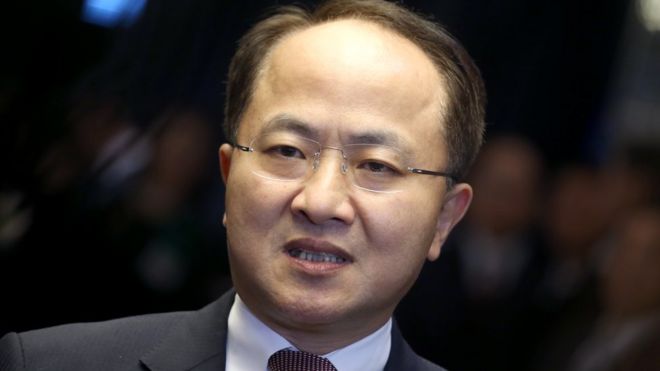 GETTY IMAGES
GETTY IMAGES
China has sacked the official in charge of relations with Hong Kong, Chinese state media reports.
Wang Zhimin was director of Beijing's liaison office for the territory.
The Xinhua news agency said Mr Wang had been replaced by Luo Huining, the Communist Party secretary for the northern province of Shanxi.
The sacking follows six months of often violent pro-democracy protests in Hong Kong that have tested Beijing's patience with top officials there.
Carrie Lam, the chief executive of Hong Kong, remains in office with the public support of the mainland leadership, despite being the face of a proposed bill which initially sparked unrest in March 2019.
The bill would have allowed for criminal suspects to be extradited from Hong Kong to mainland China, raising fears that the new law would be abused to detain dissidents and remove them from the territory.
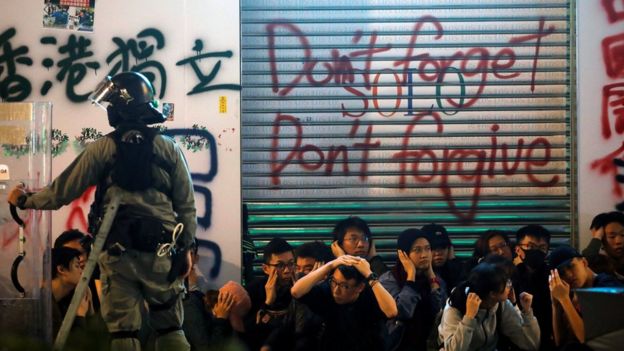 REUTERS
REUTERS
Hong Kong's protesters welcomed the new decade on Wednesday with a New Year's Day rally, which saw tens of thousands of people join a pro-democracy march. The gathering was largely peaceful, save for some small pockets of violence.
Police used water cannon to clear the Mong Kok market district and fired tear gas and rubber bullets at protesters.
Some 40 parliamentarians and dignitaries from 18 countries sent an open letter to Ms Carrie Lam on New Year's Eve, urging her to "seek genuine ways forward out of this crisis by addressing the grievances of Hong Kong people".
Hong Kong was a British colony until 1997, when it was returned to Chinese control under the principle of "one country, two systems". While it is technically part of China, the territory has its own legal system and borders, and rights including freedom of assembly and free speech are protected.
Hong Kong's Lam promises to work closely with Beijing's new envoy
City's chief executive makes no mention of prolonged protests and pledges to return Hong Kong to 'right path'.
6 Jan 2020
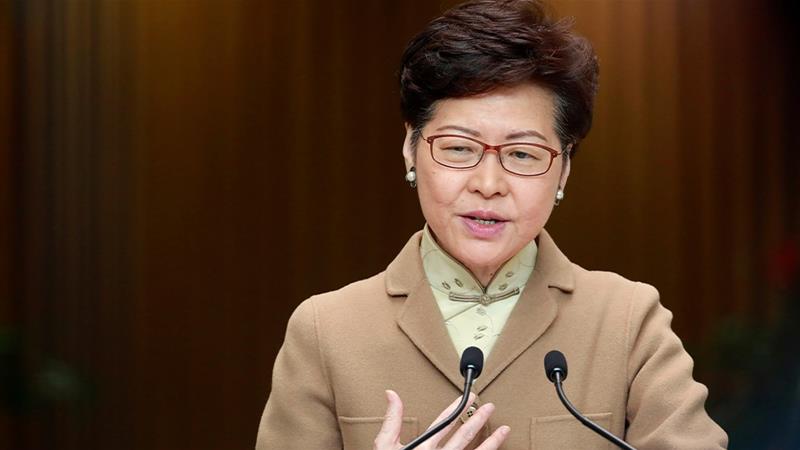
Hong Kong Chief Executive Carrie Lam said she hoped
the territory would return to the 'right path', echoing
comments made by China's top official in the city,
Luo Huining, who was appointed at the weekend
[Navesh Chitrakar/Reuters]
The appointment of a new head of the Chinese government's most important office in Hong Kong, Luo Huining, was unexpectedly announced at the weekend in a sign of Beijing's frustration with the latter's handling of the crisis.
More:
"I would work closely with director Luo in the coming future, committing to 'one country, two systems', and the Basic Law, for Hong Kong to ... return to the right path," Lam said in her first news conference of the year, referring to the city's mini-constitution and system of governance.
Luo on Monday, in his first remarks since taking office, used the same language, saying he hoped the city would return to the right path.
Lam did not mention the protests in her opening remarks, which focused on health risks related to an outbreak of a respiratory virus in the city of Wuhan on the mainland.
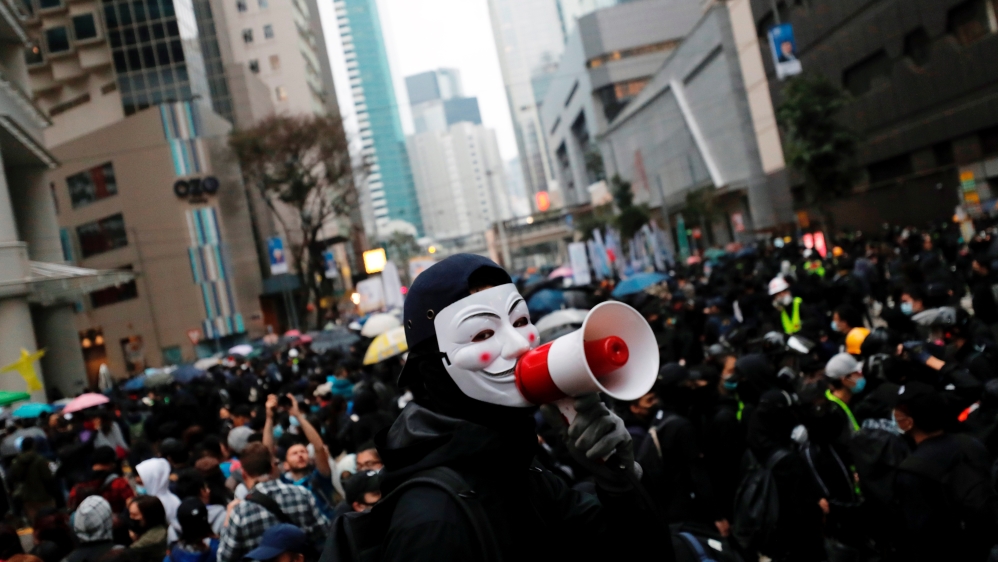
Democracy protests resumed over the New Year after a
MORE ON HONG KONG PROTESTSWhy are people protesting in Hong Kong? | Start HereHong Kong's Lam promises to work closely with Beijing's new envoyTea and tear gas: Hong Kong's shops on the economic front lines'Return to right path': Beijing's new envoy tells Hong KongHong Kong Chief Executive Carrie Lam said on Tuesday that she would work closely with Beijing's top official in the territory to get the city back on "the right path" after more than six months of pro-democracy protests.
The appointment of a new head of the Chinese government's most important office in Hong Kong, Luo Huining, was unexpectedly announced at the weekend in a sign of Beijing's frustration with the latter's handling of the crisis.
More:
'Return to the right path', China official tells Hong KongThe Liaison Office of the Central People's Government in the Hong Kong Special Administrative Region reports to China's State Council or cabinet, and is the main platform for Beijing to project its influence in the city.
Tea and tear gas: Struggling for business in a city under siege
Hong Kong's first rally of 2020 ends in clashes
"I would work closely with director Luo in the coming future, committing to 'one country, two systems', and the Basic Law, for Hong Kong to ... return to the right path," Lam said in her first news conference of the year, referring to the city's mini-constitution and system of governance.
Luo on Monday, in his first remarks since taking office, used the same language, saying he hoped the city would return to the right path.
Lam did not mention the protests in her opening remarks, which focused on health risks related to an outbreak of a respiratory virus in the city of Wuhan on the mainland.

Democracy protests resumed over the New Year after a
lull during December; Chief Executive Carrie Lam says
she hopes the territory will return to the 'right path'
[File: Tyrone Siu/Reuters]
Authorities have identified 21 cases in Hong Kong, of which seven people have been released from hospital.
Authorities have identified 21 cases in Hong Kong, of which seven people have been released from hospital.
Broad support
Clashes between police and protesters intensified over the year-end holiday following an early-December lull in violence after an overwhelming win of the pro-democracy camp in city district council elections yielded no government concessions.
The protests in Chinese-ruled Hong Kong, which began over a now-dropped extradition bill, have evolved into a broader campaign for democracy with demands for universal suffrage and an independent inquiry into complaints of police brutality.
The police maintain they have acted with restraint.
Many people in Hong Kong are angered by what they see as Beijing's ever-tightening grip on the city which was promised a high degree of autonomy under a "one country, two systems" framework when it was returned to Chinese rule in 1997.
Beijing denies interference and blames the West for heightening the unrest.
The protest movement is supported by 59 percent of city residents polled in a survey conducted for Reuters by the Hong Kong Public Opinion Research Institute, while 57 percent of them wanted Lam to resign.
SOURCE: NEWS AGENCIES
Dozens held in Hong Kong after
violence at parallel trading march
Protests target mainlanders’ practice of bulk-buying goods to sell at profit in China
Agence France-Presse in Hong Kong
Sun 5 Jan 2020
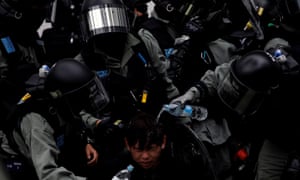
Police pour water on a protester who was
pepper-sprayed while being detained in
Sheung Shui.
Photograph: Navesh Chitrakar/Reuters
Petrol bombs have been thrown at a Hong Kong police station and dozens of people arrested after a march against parallel trading near the Chinese border.
The Democratic party said about 10,000 people marched peacefully in Sheung Shui district on Sunday, but violence erupted after police ordered protesters to disperse.
Several petrol bombs were thrown at Sheung Shui police station, about 1.5km (1 mile) from where the rally took place.
A pro-democracy movement in Hong Kong has been demanding greater freedoms from Beijing for nearly seven months.
The marchers were protesting against parallel trading, by which thousands of mainlanders cross the border every day to bulk-buy goods such as infant formula to sell at a profit in China.
There is significant resentment against the practice, which frequently leaves goods in short supply in border towns, and has driven up the price of commodities as well as shop rents.
Dino Chan, a Sheung Shui district councillor and one of the rally organisers, said: “If the police could spare one of the cars they drove here to handle the march to instead deal with the trading problem, we would not have to organise this protest.”
He said 42 people were arrested following the violence.
The anti-government protests have been blamed for helping plunge Hong Kong’s economy into recession for the first time in a decade.
The protests were triggered by a proposal to allow extraditions to mainland China, but have morphed into a broader revolt for democratic freedoms.
On Sunday, the violence was not at the level seen during many previous protests, with police using pepper spray to disperse crowds but not teargas.
China and the Hong Kong administration have refused to bow to protesters’ demands, which include direct elections, an inquiry into alleged police misconduct and an amnesty for the nearly 7,000 people arrested so far.
HONG KONG
Tea and tear gas: Hong Kong's shops on the economic front line
As visitor numbers and retail sales figures plunge due to protests, some Hong Kong shop owners stand their ground.
by Caroline Malone 6 Jan 2020

Petrol bombs have been thrown at a Hong Kong police station and dozens of people arrested after a march against parallel trading near the Chinese border.
The Democratic party said about 10,000 people marched peacefully in Sheung Shui district on Sunday, but violence erupted after police ordered protesters to disperse.
Several petrol bombs were thrown at Sheung Shui police station, about 1.5km (1 mile) from where the rally took place.
A pro-democracy movement in Hong Kong has been demanding greater freedoms from Beijing for nearly seven months.
The marchers were protesting against parallel trading, by which thousands of mainlanders cross the border every day to bulk-buy goods such as infant formula to sell at a profit in China.
There is significant resentment against the practice, which frequently leaves goods in short supply in border towns, and has driven up the price of commodities as well as shop rents.
Dino Chan, a Sheung Shui district councillor and one of the rally organisers, said: “If the police could spare one of the cars they drove here to handle the march to instead deal with the trading problem, we would not have to organise this protest.”
He said 42 people were arrested following the violence.
The anti-government protests have been blamed for helping plunge Hong Kong’s economy into recession for the first time in a decade.
The protests were triggered by a proposal to allow extraditions to mainland China, but have morphed into a broader revolt for democratic freedoms.
On Sunday, the violence was not at the level seen during many previous protests, with police using pepper spray to disperse crowds but not teargas.
China and the Hong Kong administration have refused to bow to protesters’ demands, which include direct elections, an inquiry into alleged police misconduct and an amnesty for the nearly 7,000 people arrested so far.
HONG KONG
Tea and tear gas: Hong Kong's shops on the economic front line
As visitor numbers and retail sales figures plunge due to protests, some Hong Kong shop owners stand their ground.
by Caroline Malone 6 Jan 2020

Lo Bak Jun, owner of a well known tea house in Hong Kong,
says business is the worst it has ever been for him, as
violent pro-democracy protests show no sign of ending,
driving tourists away [Caroline Malone/Al Jazeera]
Hong Kong, China: Lo Bak Jun and his family have been running their successful tea house in Hong Kong for about three decades. He puts in approximately 70 hours a week, but despite the hard work, business is suffering.
"It's gotten worse since June this year. Business this year is the worst in 30 years for the shop," Lo told Al Jazeera.
Lo's parents started the Kam Yuen Tea House in the early 1990s when Hong Kong's economy was booming. But now, the city is in recession, tipped over the edge by more than six months of unrest and a protracted trade war between the United States and China.
Small businesses like his are on the financial front line, as tourists stay away and retail sales plunge.
He sells traditional and specialist Chinese teas such as Jasmine, Tieguanyin and Pu'er at the teahouse. He warmly welcomes customers, inviting them to sample different brews, and is happy to host regulars for hours who sip and chat.
"Some tourists will sit here all day and drink all the tea they are given."
In the past, at least one tour group would visit the shop a day. Now, days go past without a single foreign customer.
Government data shows Hong Kong visitor numbers were down 56 percent in November from a year earlier, after a 44 percent drop in October when tourism is usually thriving around China's national Golden Week holiday.
Lo misses his foreign customers but says he relies on locals for most of his business. For every 20 Hong Kong dollars ($2.57) spent by a tourist in his shop, a Hong Kong local would spend approximately 100 Hong Kong dollars ($12.85). "Hong Kong people love tea," says Lo.
Kam Yuen Tea House is in the bustling residential and commercial neighbourhood of Sai Ying Pun, west of Hong Kong's central business district.
Beijing's liaison office is on a parallel road nearby.
The area was the scene of some of the first provocative acts last year by protesters, who vandalised the Chinese emblem and threw eggs at the building. The police response was harsh, with liberal amounts of tear gas and mass arrests. It was the start of an escalation in violence that has seen protesters fighting and throwing petrol bombs while police use rubber bullets, bean bag rounds and even occasionally live gunfire to quell the unrest.
Lo says he had to close the shop twice when protesters passed by. But he is sympathetic. "The students are polite," he continues, "the government needs to do better."
It all started earlier in 2019, when the Hong Kong government tried to rush through a new extradition bill. People protested over concerns it would give Beijing a legal avenue for political persecution, but it also stoked deeper resentment over a lack of universal suffrage in Hong Kong.
Growing frustration, shrinking economy
There is also pent-up frustration over stagnating living standards in a city with some of the world's most expensive real estate, making Hong Kong one of the least affordable places to live on the planet.
The protests against the bill evolved early on into five key demands including the release of protesters arrested during early demonstrations, an independent investigation into harsh police action against protesters and the right to fully vote for legislators and the Chief Executive, the head of Hong Kong Special Administrative Region.

Anti-government protests in Hong Kong over the last six months have frequently turned violent [January 5: Tyrone Siu/Reuters]
After a tumultuous six months, the extradition bill is out, but Chief Executive Carrie Lam remains in.
The unrest has resulted in economic losses amounting to about two percentage points of Hong Kong's gross domestic product (GDP) - the sum of all finished goods and services produced in an economy - according to Financial Secretary Paul Chan.
The economy entered its first recession since the 2008-2009 global financial crisis. Recent official estimates showed the economy contracted by 3.2 percent in the third quarter.
As the government sees it: "Local social incidents dealt a very severe blow to an economy already weakened by a synchronised global economic slowdown and US-Mainland trade tensions."
Economists forecast the loss of tourism will have a significant impact on Hong Kong's annual GDP.
Iris Pang, Greater China economist with ING Wholesale Banking told Al Jazeera "The direct impact of loss of tourism should amount to three percent of GDP. Indirect damage is that the impact of unemployment and underemployment due to the loss of tourism activities will appear in GDP data gradually. These impacts include fall in local consumption."
ING forecasts that Hong Kong's GDP most likely contracted by 2.2 percent in 2019, and will shrink by a further 5.8 percent in 2020.
Chief Executive Lam and her embattled government have drip-fed a series of initiatives to support the economy. The latest for small and medium businesses is four billion Hong Kong dollars ($514m) in stimulus measures including subsidies on water and sewage bills, an instalment system for profits and salaries tax, and training programs.
There are about 340,000 small and medium enterprises (SMEs) in Hong Kong, which employ approximately 1.3 million people - or 45 percent of the workforce - in the private sector. In a place known for ease of setting up a business, SMEs make up more than 98 percent of all business establishments.
The Trade and Development Council says government support is vital: "The new round of measures will help ease the cash flow of SMEs, which will help restore confidence in affected industries by enabling them to continue their business."
Hong Kong-based Shanghai Commercial Bank Head of Research Ryan Lam told Al Jazeera his analysis shows the government's measures could help boost Hong Kong's GDP by 0.2 percent. "It is meaningful, because SMEs are likely to spend funds instead of stashing them under the pillow during a recession."
But for small business owners, like Lo, the government subsidies are not making any difference, especially while there is no end in sight to the unrest: "The students have made demands, but the government is not doing anything about it. So it's not going to stop."

Tourists from near and far have frequented Lo Bak Jun's tea house in Hong Kong for 30 years [Caroline Malone/Al Jazeera]
Hong Kong's entire retail sector is feeling the pinch with data showing overall sales fell 23.6 percent in November compared with the same month in 2018. It was the tenth consecutive month of falling sales, and was only marginally better than the record 24.4 percent year-on-year plunge in October.
Hardest hit were sales of jewellery, watches, clocks, and valuable gifts, which plummeted by 43.5 percent in November; medicine and cosmetics sales slumped by 33.4 percent while clothing fell by 31.9 percent. Even food, alcoholic drinks and tobacco sales dropped by 11 percent.
'Chasing an elephant with a pop gun'
Enzio von Pfeil, economist and financial adviser with St James's Place Wealth Management in Hong Kong, told Al Jazeera the lack of government action to address social ills - expensive housing, income disparity, antiquated education and a lack of competition - is the real problem.
"Government measures are akin to chasing an elephant with a pop gun."
There is also the continued uncertainty with the US-China trade negotiations to consider.
"It's all going to be pretty gloomy. The structural forces of Hong Kong's domestic problems, the cyclical forces with worsening economic times, and random forces of Trump's political antics," Pfeil said, referring to the US president's negotiating tactics.

Kam Yuen Tea House, Hong Kong [Caroline Malone/Al Jazeera]
Tommy Wu, senior economist at Oxford Economics, told Al Jazeera: "Retail sales and tourist-related sectors are experiencing their worst performance in over a decade and will remain under huge strain as a result of the plunge in inbound tourism and weak domestic sentiment,"
"This will lead to a spike in unemployment in 2020," said Wu.
Back at Kam Yuen Tea House, Lo says he understands people just do not have the same spending power they used to have.
"If I had the money, I would leave Hong Kong." He adds: "Just kidding, I'm staying."
Lo may be staying but he is having to adjust to a new normal in Hong Kong that has made business and everyday life much harder.
"Everyone is heartbroken about Hong Kong, " he says. "I'm not even going to look at the news today."
SOURCE: AL JAZEERA NEWS
says business is the worst it has ever been for him, as
violent pro-democracy protests show no sign of ending,
driving tourists away [Caroline Malone/Al Jazeera]
MORE ON HONG KONG PROTESTSWhy are people protesting in Hong Kong? | Start HeretodayTea and tear gas: Hong Kong's shops on the economic front lines2 days ago'Return to right path': Beijing's new envoy tells Hong Kong2 days agoChina replaces Hong Kong liaison office head amid protests4 days ago
Hong Kong, China: Lo Bak Jun and his family have been running their successful tea house in Hong Kong for about three decades. He puts in approximately 70 hours a week, but despite the hard work, business is suffering.
"It's gotten worse since June this year. Business this year is the worst in 30 years for the shop," Lo told Al Jazeera.
Lo's parents started the Kam Yuen Tea House in the early 1990s when Hong Kong's economy was booming. But now, the city is in recession, tipped over the edge by more than six months of unrest and a protracted trade war between the United States and China.
Small businesses like his are on the financial front line, as tourists stay away and retail sales plunge.
He sells traditional and specialist Chinese teas such as Jasmine, Tieguanyin and Pu'er at the teahouse. He warmly welcomes customers, inviting them to sample different brews, and is happy to host regulars for hours who sip and chat.
"Some tourists will sit here all day and drink all the tea they are given."
In the past, at least one tour group would visit the shop a day. Now, days go past without a single foreign customer.
Government data shows Hong Kong visitor numbers were down 56 percent in November from a year earlier, after a 44 percent drop in October when tourism is usually thriving around China's national Golden Week holiday.
Lo misses his foreign customers but says he relies on locals for most of his business. For every 20 Hong Kong dollars ($2.57) spent by a tourist in his shop, a Hong Kong local would spend approximately 100 Hong Kong dollars ($12.85). "Hong Kong people love tea," says Lo.
Kam Yuen Tea House is in the bustling residential and commercial neighbourhood of Sai Ying Pun, west of Hong Kong's central business district.
Beijing's liaison office is on a parallel road nearby.
The area was the scene of some of the first provocative acts last year by protesters, who vandalised the Chinese emblem and threw eggs at the building. The police response was harsh, with liberal amounts of tear gas and mass arrests. It was the start of an escalation in violence that has seen protesters fighting and throwing petrol bombs while police use rubber bullets, bean bag rounds and even occasionally live gunfire to quell the unrest.
Lo says he had to close the shop twice when protesters passed by. But he is sympathetic. "The students are polite," he continues, "the government needs to do better."
It all started earlier in 2019, when the Hong Kong government tried to rush through a new extradition bill. People protested over concerns it would give Beijing a legal avenue for political persecution, but it also stoked deeper resentment over a lack of universal suffrage in Hong Kong.
Growing frustration, shrinking economy
There is also pent-up frustration over stagnating living standards in a city with some of the world's most expensive real estate, making Hong Kong one of the least affordable places to live on the planet.
The protests against the bill evolved early on into five key demands including the release of protesters arrested during early demonstrations, an independent investigation into harsh police action against protesters and the right to fully vote for legislators and the Chief Executive, the head of Hong Kong Special Administrative Region.

Anti-government protests in Hong Kong over the last six months have frequently turned violent [January 5: Tyrone Siu/Reuters]
After a tumultuous six months, the extradition bill is out, but Chief Executive Carrie Lam remains in.
The unrest has resulted in economic losses amounting to about two percentage points of Hong Kong's gross domestic product (GDP) - the sum of all finished goods and services produced in an economy - according to Financial Secretary Paul Chan.
The economy entered its first recession since the 2008-2009 global financial crisis. Recent official estimates showed the economy contracted by 3.2 percent in the third quarter.
As the government sees it: "Local social incidents dealt a very severe blow to an economy already weakened by a synchronised global economic slowdown and US-Mainland trade tensions."
Economists forecast the loss of tourism will have a significant impact on Hong Kong's annual GDP.
Iris Pang, Greater China economist with ING Wholesale Banking told Al Jazeera "The direct impact of loss of tourism should amount to three percent of GDP. Indirect damage is that the impact of unemployment and underemployment due to the loss of tourism activities will appear in GDP data gradually. These impacts include fall in local consumption."
ING forecasts that Hong Kong's GDP most likely contracted by 2.2 percent in 2019, and will shrink by a further 5.8 percent in 2020.
Chief Executive Lam and her embattled government have drip-fed a series of initiatives to support the economy. The latest for small and medium businesses is four billion Hong Kong dollars ($514m) in stimulus measures including subsidies on water and sewage bills, an instalment system for profits and salaries tax, and training programs.
There are about 340,000 small and medium enterprises (SMEs) in Hong Kong, which employ approximately 1.3 million people - or 45 percent of the workforce - in the private sector. In a place known for ease of setting up a business, SMEs make up more than 98 percent of all business establishments.
The Trade and Development Council says government support is vital: "The new round of measures will help ease the cash flow of SMEs, which will help restore confidence in affected industries by enabling them to continue their business."
Hong Kong-based Shanghai Commercial Bank Head of Research Ryan Lam told Al Jazeera his analysis shows the government's measures could help boost Hong Kong's GDP by 0.2 percent. "It is meaningful, because SMEs are likely to spend funds instead of stashing them under the pillow during a recession."
But for small business owners, like Lo, the government subsidies are not making any difference, especially while there is no end in sight to the unrest: "The students have made demands, but the government is not doing anything about it. So it's not going to stop."

Tourists from near and far have frequented Lo Bak Jun's tea house in Hong Kong for 30 years [Caroline Malone/Al Jazeera]
Hong Kong's entire retail sector is feeling the pinch with data showing overall sales fell 23.6 percent in November compared with the same month in 2018. It was the tenth consecutive month of falling sales, and was only marginally better than the record 24.4 percent year-on-year plunge in October.
Hardest hit were sales of jewellery, watches, clocks, and valuable gifts, which plummeted by 43.5 percent in November; medicine and cosmetics sales slumped by 33.4 percent while clothing fell by 31.9 percent. Even food, alcoholic drinks and tobacco sales dropped by 11 percent.
'Chasing an elephant with a pop gun'
Enzio von Pfeil, economist and financial adviser with St James's Place Wealth Management in Hong Kong, told Al Jazeera the lack of government action to address social ills - expensive housing, income disparity, antiquated education and a lack of competition - is the real problem.
"Government measures are akin to chasing an elephant with a pop gun."
There is also the continued uncertainty with the US-China trade negotiations to consider.
"It's all going to be pretty gloomy. The structural forces of Hong Kong's domestic problems, the cyclical forces with worsening economic times, and random forces of Trump's political antics," Pfeil said, referring to the US president's negotiating tactics.

Kam Yuen Tea House, Hong Kong [Caroline Malone/Al Jazeera]
Tommy Wu, senior economist at Oxford Economics, told Al Jazeera: "Retail sales and tourist-related sectors are experiencing their worst performance in over a decade and will remain under huge strain as a result of the plunge in inbound tourism and weak domestic sentiment,"
"This will lead to a spike in unemployment in 2020," said Wu.
Back at Kam Yuen Tea House, Lo says he understands people just do not have the same spending power they used to have.
"If I had the money, I would leave Hong Kong." He adds: "Just kidding, I'm staying."
Lo may be staying but he is having to adjust to a new normal in Hong Kong that has made business and everyday life much harder.
"Everyone is heartbroken about Hong Kong, " he says. "I'm not even going to look at the news today."
SOURCE: AL JAZEERA NEWS
No comments:
Post a Comment